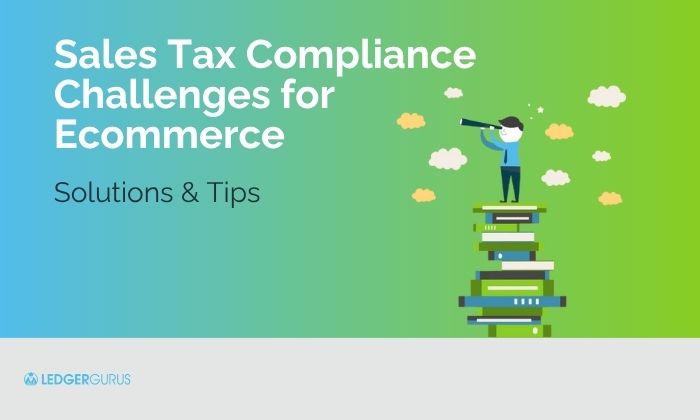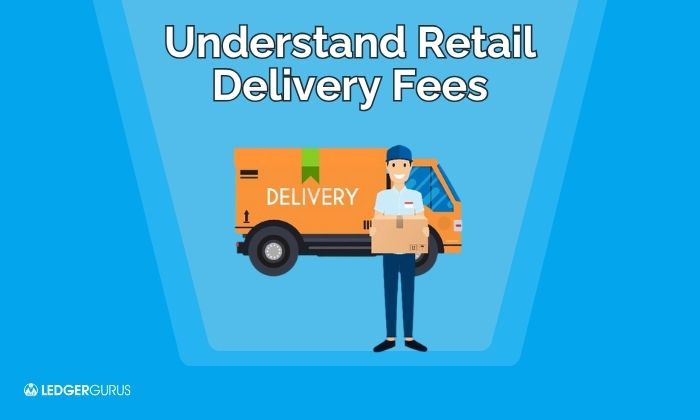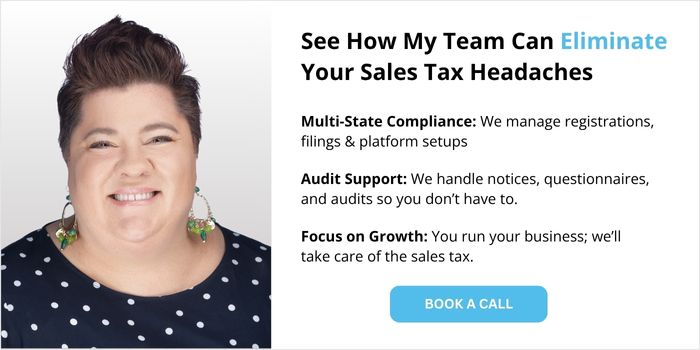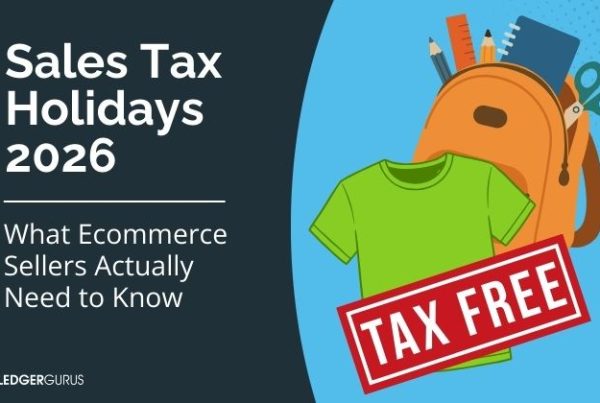Ever since Wayfair vs. South Dakota in 2018, states have become increasingly aggressive toward online sellers about sales tax compliance.
The problem is that this isn’t a simple, cut-and-dried issue. There are over 13,000 sales tax jurisdictions in the United States, and the rules and regulations are constantly changing.

This article covers the 9 steps + a bonus you need follow to protect you business.
The goal is to review each step and give you some resources to help you manage it.
If you’d prefer, you can watch the video on this same topic.
In this blog, we’ll cover:
- Review your nexus footprint
- Navigate Voluntary Disclosure Agreements (VDAs)
- Determine your product taxability
- Collect valid exemption certificates
- Calculate and report use tax
- Understand retail delivery fees
- Deal with home-ruled jurisdictions
- Be aware of aggressive states
- Prepare for sales tax holidays
- Be aware of transaction threshold changes
- How to get help with sales tax compliance
Let’s get into it.
Key Takeaways
- Sales tax compliance challenges are increasing for online sellers. Since the 2018 Wayfair ruling, states have ramped up efforts to enforce sales tax on online sales, making compliance complex across thousands of jurisdictions.
- This article covers 9 essential steps to help you get compliant. Following these steps—from understanding your “nexus” obligations to collecting exemption certificates and managing sales tax holidays—can help you stay compliant and avoid penalties.
- Stay proactive with high-risk states. Certain states are more aggressive in pursuing online sellers for sales tax, so registering promptly once you meet thresholds in these states is crucial.
- Help is available. LedgerGurus offers support, from consultations and training to full-service management, to help businesses navigate sales tax compliance effectively.
Review Your Nexus Footprint for Where You Have Sales Tax Obligations
The first and most crucial step in sales tax compliance is reviewing your nexus footprint. Everything else builds on this foundation.
Knowing where you have sales tax nexus—or where you soon will—is absolutely vital.
At LedgerGurus, we handle a lot of sales tax permit registrations for our clients, and we’ve noticed that states are becoming increasingly aggressive.
Take Illinois, for example. Their audit lookback period can go all the way back to when their marketplace facilitator laws went into effect in 2018.
Other states are requesting up to three years of sales histories to verify nexus thresholds.
So, don’t wait to register after reaching nexus thresholds, thinking it’ll just go away or you can fly under the radar. This can cause serious problems for your business.
Here are a few key points to remember:
- Aggregate sales across channels: Make sure you include ALL your sales from ALL your channels to determine nexus. For instance, if you’re selling on both Amazon and Shopify, and you’ve sold $75,000 into Arizona on Amazon and $35,000 on Shopify, you’ve passed the economic threshold of $100,000. You need to register and set up your Shopify channel to collect in Arizona. Amazon takes care of its own collection and remitting, but you’re responsible to collect and remit sales tax on your Shopify sales.
- No collection before nexus: You’re not responsible for sales tax before you have nexus in a state, whether through physical presence or passing the economic nexus threshold.
- Register before collecting: You must register before you start collecting sales tax in a state. Don’t set up your channels to collect in a state before you have nexus and have registered.
Collecting without a sales tax permit is illegal and considered criminal fraud. Some platforms like Shopify may notify you to start collecting in a state, but ensure you do it right by following these steps IN ORDER:
- First, confirm your nexus.
- Next, register.
- Then, set up your channel to start collecting, using your registration date as the starting point.
To help you navigate this, we have two resources:
- 10 Steps to Ensure Sales Tax Doesn’t Burn Down Your Ecommerce Business guide: This guide includes a section on nexus, detailing what determines nexus and a state-by-state chart of economic thresholds. It’s a valuable resource and it’s free.
- “The Uncomplicated Truth About Sales Tax” Masterclass: This free masterclass goes into great detail about Nexus, who is responsible, and all the nuances of sales tax. It’s an excellent resource for more in-depth understanding.
Remember, staying aware of your nexus footprint is critical for maintaining compliance and avoiding unnecessary complications. Make it a regular part of your routine to review and update your nexus status.
Navigate Voluntary Disclosure Agreements
If you didn’t register in a timely manner and now have sales tax obligations in one or more states, you might be starting to feel a bit panicky.
You may want to consider a voluntary disclosure agreement (VDA) is these states. These programs, offered by many state governments, allow businesses to come forward and report their unpaid sales taxes.
You might wonder, “Why would I want to do that?” Here’s why:
- Reduced penalties and interest: In return for disclosing unpaid taxes, states will often reduce penalties and interest.
- Shorter lookback periods: VDAs require businesses to pay back the sales tax and interest for a specific period, typically shorter than the timeframe an audit would cover. This can save you a significant amount of money and stress. (For instance, Illinois’ Voluntary Disclosure Program limits the lookback period to 4 years.)
- Voluntary participation: These programs are voluntary, meaning you must take the initiative to come forward and agree to the VDA terms.
Navigating VDAs can be complex, but you don’t have to do it alone. LedgerGurus has a team of sales tax experts who can guide you through the process, ensuring you meet all the requirements and get the best possible outcome.
Remember, taking action now can help you avoid bigger headaches down the road. If you’re in this situation, consider a VDA as a proactive step to get back on track with your sales tax compliance.
Watch How to Use a VDA to Wipe Out Sales Tax Liabilities for more details:
Determine Product Taxability
The third crucial step is reviewing your product taxability. This is important because even if you’ve passed the economic nexus threshold in a state, if your products aren’t taxable, you don’t have to collect sales tax.
Key points to remember:
- Know your products: If you’re selling standard tangible personal property, like widgets, this might not concern you. But if you’re in special categories like clothing, software as a service, foods and groceries, or supplements, the laws might have changed.
- Stay updated on changes: For instance, Kansas is slowly implementing laws that will soon eliminate sales tax on food and groceries. In New York, individual clothing and footwear items under $110 are exempt from New York City and NY state sales tax, but they are taxable once they exceed that amount. Another instance is how candy is taxed differently depending on ingredients. Keeping track of these changes is crucial.
- Regular reviews: It’s vital to know what laws affect your products in all the states where you have nexus or will soon have nexus. Believe me, it’s better to be safe than sorry. Checking this at least yearly is a good practice.
- Use Available Tools: If you’re an AvaTax user, take advantage of their taxability matrix, which they update monthly. This can be a handy tool to ensure you’re always in compliance. If you’re not, here is another taxability matrix.
By staying on top of product taxability, you can avoid unnecessary complications and ensure you’re only collecting sales tax when required. Make this a regular part of your compliance routine to keep your business running smoothly.
Collect Valid Exemption Certificates
The fourth crucial step is collecting exemption certificates for sales tax exemptions. This is really important because sales tax audits are becoming FAR more common.
You need to ensure you have valid exemption certificates on file for any tax-exempt customers. Examples of these customers include governments, nonprofits, and schools. This also applies if you’re selling to customers who are reselling the products.
Key points to remember:
- Valid certificates: Make sure you have valid certificates on file for all tax-exempt customers. This is critical for avoiding unnecessary tax liabilities.
- Drop shipping considerations: If you’re drop shipping from suppliers, ensure you send them resale certificates so you can be exempt from paying sales tax. If you are the supplier, you need to get valid exemption certificates from your sellers. We have a whole article about how sales tax works for dropshipping, so read that for more information.
- Monitor expiration dates: For any states where you have nexus, keep an eye on the expiration dates of these documents. Stay in contact with your customers to renew them before they expire.
- Protect yourself: It’s vital to protect yourself because if you get audited and don’t have these certificates, you’ll be on the hook for the uncollected sales tax. If a customer claims they’re buying to resell or says they’re tax-exempt, always ask for a valid exemption certificate. If they can’t provide it, you have the right to charge them sales tax.
By staying on top of this issue, you protect your business from unexpected tax liabilities and ensure compliance.
Make it a habit to review and update these documents regularly.
Calculate and Report Use Tax
The next thing to tackle is use tax. This area is heavily audited for online sellers, so it’s crucial to understand and stay compliant.
Key points to remember:
- Understand use tax: Use tax applies to products that are used but not sold, such as product giveaways, promotional samples, or donations. These items need to be reported as use tax on your state’s return.
- Filing use tax: Typically, use tax is recorded on the same return as sales tax, and you usually only need to worry about it in your home state.
- Stay informed: This article on how use tax affects ecommerce businesses goes into more detail and explains how to figure out how much tax you owe.
By keeping track of use tax, you can avoid potential audits and ensure your business stays compliant.
Understand Retail Delivery Fees

The sixth area to be aware of is retail delivery fees. These are starting to pop up, and they apply to transactions delivered by a motor vehicle.
Though the details vary by state, they all aim to generate more revenue without requiring a vote on the ballot—kind of sneaky, huh?
Key points to remember:
- Know the rates and the states: Colorado was the pioneer, introducing a fee of $.27 per transaction in July 2022, which increased to $.29 in 2024. Minnesota is following suit with a $.50 fee per transaction over $100 starting in July 2024.
- Watch for small seller exemptions: Thanks to the uproar from sellers after Colorado’s implementation, both Colorado and Minnesota now have small seller exemptions in place. Colorado’s only takes effect after a business sells $500,000 into the state in a calendar year, while Minnesota’s doesn’t take effect until $1M in sales.
- Stay updated on state legislation: New York is also considering a retail delivery fee, proposing a $.25 per delivery.
- Use available resources: We have an article on Colorado’s retail delivery fee and another on Minnesota’s that you can access for more information, and we’ll continue to update you as more states introduce these fees. 6 more states are considering jumping on the bandwagon of retail delivery fees in 2025.
Understanding and preparing for retail delivery fees will help you stay compliant and avoid unexpected costs. Keep an eye on new legislation in your state and adjust your business practices accordingly.
Deal with Home Rule Jurisdictions
On top of all the sales tax variations by state, some states are even harder to be compliant with and meet sales tax obligations because of home rule jurisdictions.
States like Colorado, Alabama, Alaska, Arizona, Idaho, and Louisiana have local jurisdictions that administer their own sales tax rules, independent of the state department of revenue.
Key points to remember:
- Understand home-rule authority: In home-rule jurisdictions, local governments have the authority to establish and administer their own sales tax rules and rates. This can create a complex web of compliance requirements since each locality can have different rules.
- Colorado example: Colorado is notorious for its complex home-rule system, with 72 cities having their own sales tax rates, exemptions, and requirements to file and remit sales tax returns. Read this blog for an explanation of how to handle it.
- Alabama, Alaska, Arizona, and Louisiana: Similar complexities exist in Alabama, Alaska, Arizona, Idaho and Louisiana. Each state allows local jurisdictions significant leeway in administering sales tax, leading to varying requirements across the state. Efforts are underway to simplify Alabama’s and Louisiana’s rules, though.
- Stay organized: Keeping track of all these local rules can be daunting. It’s essential to stay organized and ensure you’re compliant with each tax jurisdiction where you have nexus. Using a robust sales tax automation tool can help manage these complexities.
- Seek expert help: If you’re struggling to keep up with the different rules, consider seeking expert help. At LedgerGurus, we have a team of sales tax experts who can guide you through the complexities of home-rule jurisdictions, ensuring you remain compliant and avoid penalties.
Navigating home-rule jurisdictions requires diligence and organization. Make sure you understand the rules in each locality where you do business, and stay proactive in managing your compliance obligations.
Be Aware of Aggressive States
Another major sales tax compliance issue is registering in states as you pass the threshold, especially the aggressive ones.
Many states are becoming more assertive, but some are particularly tough on online sellers. This ties back to knowing where you have nexus, and we can’t stress this enough. Don’t ignore this issue.
Key points to remember:
- Identify aggressive states: As of now, the states that are really targeting online sellers include Arizona, Arkansas, California, Florida, Illinois, Maine, Massachusetts, Michigan, Minnesota, New Jersey, New York, Pennsylvania, South Carolina, South Dakota, Texas, Utah, Washington, and Wisconsin. Others are joining the crusade all the time.
- Expect scrutiny: Some states are sending out pre-audit questionnaires, questioning registration dates and requesting several years of sales history when sellers register. Others are sharing seller lists with other states and ramping up their auditing resources to pursue online sellers more effectively. And some are actively partnering with platforms, like Amazon, to obtain seller lists and determine where sellers have inventory.
- Take action: Don’t mess around. If you have nexus in these states, get registered as soon as you meet the thresholds.
Be proactive and register in aggressive states as you reach nexus to help you avoid penalties and audits.
Sales tax audits are becoming increasingly common, and it’s not really a matter of if you get audited; it’s more a matter of when.
To learn how to protect your business, read Sales Tax Audits Guide: What’s Triggering Them and What Sellers Need to Know.
Prepare for Sales Tax Holidays
The last topic we’re going to cover for sales tax compliance is sales tax holidays. This is another important area to understand.
A sales tax holiday is a specific timeframe when customers don’t have to pay sales tax on eligible purchases of normally taxable products.
As a retailer, this means you cannot collect sales tax on any eligible sales made online, in store, by email, or through any other means during the holiday period.
Key points to remember:
- Understand the Rules: Every sales tax holiday is different, but they usually have a theme. Common themes include back-to-school sales tax holidays, disaster preparedness supplies, or hunting and ammunition.
- Check State Guidelines: As of now, 22 states have a combined 45 sales tax holidays scheduled for 2024. Each state has its own rules and eligible items, so it’s important to check the guidelines for each state where you have Nexus.
- Plan Ahead: Make sure you’re prepared for these holidays. Adjust your systems so you don’t collect sales tax on eligible items during these periods.
By staying informed about sales tax holidays, you can ensure compliance and provide a better shopping experience for your customers. Keep track of these events and plan ahead to avoid any issues.
By the way, you may want to consider using software like Avalara to automatically make these changes in settings.
Be Aware of Transaction Threshold Changes
Several states are eliminating the 200-transaction requirement from their sales tax thresholds.
States that eliminated it in 2024:
- Indiana
- North Carolina
- Wyoming
Alaska is eliminating it, too, effective Jan 1, 2025.
How to Get Help with Your Sales Tax Compliance Issues
This may seem a bit overwhelming, but it doesn’t have to be.
We here at LedgerGurus are committed to helping businesses of all sizes with their sales tax compliance. To do that, we have several options for you to choose from:
- Consultation: Got a bunch of questions specific to your situation? A one-on-one consultation with one of our sales tax experts might be just what you need. We can answer your questions, guide you through processes, and even help you fill out forms correctly.
- Training course: Want to understand sales tax so you can handle it yourself or have someone on your team do it? Check out our sales tax masterclass! It’s been designed to help online sellers like you understand the pieces involved in getting and staying sales tax compliant.
- Sales tax services: If you’d rather hand off the entire sales tax hassle and focus on growing your business, consider LedgerGurus. Our team of sale tax experts deals with this every day and can take it off your plate. Click here to get in touch with us – we are happy to help!







